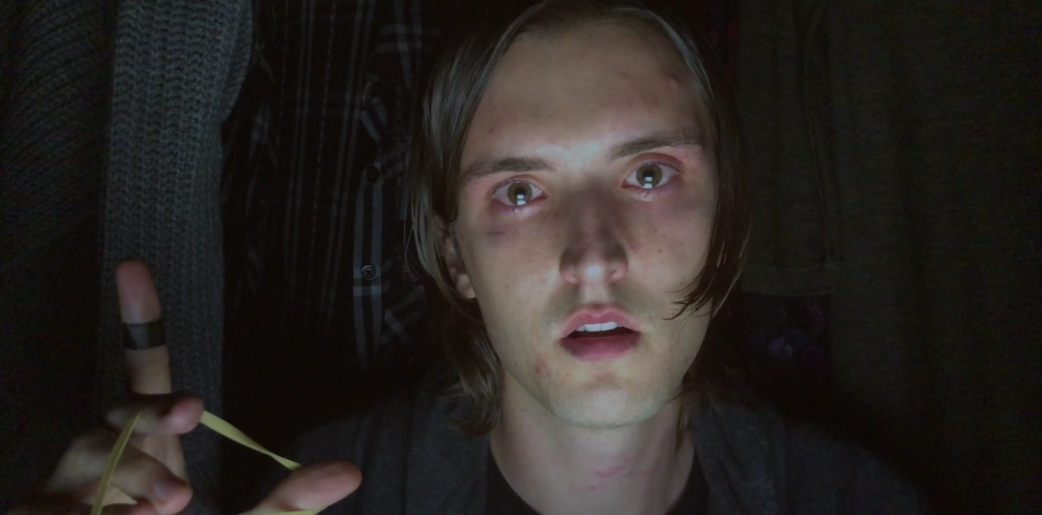
Tucia Lyman’s directing debut M.O.M. Mothers of Monsters is as candid as it is surprising. This film’s hard-hitting social commentary, in addition to its use of found footage, sets it apart from others of its kind, such as Lynn Ramsey’s We Need to Talk About Kevin or Shawn Ku’s Beautiful Boy. Tackling the weighty subjects of school shootings and the American response to gun violence, M.O.M. isn’t afraid to make a statement or two about these issues (and I think it’s clear that it does see the country’s response to gun violence as a serious issue). Through its fast-moving plot, often carried by somewhat heavy-handed monologues from the two main characters, the film demands that the audience’s attention turn to the current social and political climate of the U.S., but is careful to do so without extreme or tasteless violence.
M.O.M. follows Abbey (Melinda Page Hamilton), the single mother of sixteen-year-old Jacob (Bailey Edwards) whose heated outbursts and cruelty toward animals she fears will escalate into violence against his classmates. Feeling desperate and alone, Abbey decides to keep track of Jacob’s actions by setting up spy cameras in their home with the eventual hope of sharing what she’s learned about her son with who she identifies as “mothers of monsters,” or other parents struggling to raise a “bad kid.” But as Abbey’s helpful guidance starts to look a lot like obsession, and perhaps even the projection of childhood trauma, we begin to doubt her stability as well.

Lyman’s choice to tell Abbey and Jacob’s story through found footage showcases her creativity as a filmmaker and suits the ambiguity that colors the entire film. This style invites us into the nuances of Abbey’s personal thoughts and feelings as she confides to the viewer her fears, her frustrations, and the resentment she experiences as Jacob’s mother. With privileged access to Abbey’s thoughts, we are placed in a position to ask one of the many questions raised in the film: is Abbey a reliable narrator?
Which brings me to my next point. Perhaps even more forceful is Lyman’s use of found footage to implicate us, the viewers (or, in this case, voyeurs), in the all-too-common fetishization of violence and tragedy, especially through the American media. Aside from Abbey explicitly declaring, “If you’re not a mom with a troubled kid and watching this, then you’re a psychopath,” the message here is otherwise quietly stated, so much so that at times you have to hold your ear close to the TV speaker to hear it (and I mean this literally, so turn up your volume when you hear news reports in the film). Throughout the film, the blame for Jacob’s violent tendencies gets tossed from video games to his environment to genetics, but in a similar fashion to Michael Powell’s Peeping Tom, the audience does not escape this film completely without judgment.


M.O.M. also displays acute social awareness. This is where the film’s advocating spirit comes into play. From Abbey’s M.O.M. videos to our own quiet viewing of Jacob at home via spy cameras, bits and pieces of the film’s deeper message emerge, sometimes quietly and at other times in the form of a mother’s unambiguous exasperation. In one video recorded from her tiny closet, Abbey looks into the camera, defeated, and addresses one of the key concerns of the film: “I don’t understand why there aren’t more resources to deal with this sort of thing.” It’s certainly not hard to get the message here. In addition to Abbey’s lack of resources, we also see a handful of nods throughout the film toward the racist subculture that fuels Jacob’s feelings of disenfranchisement (see his swastika-laden gas mask, multiple generations of lizards named Adolf, and an interest in news coverage of what appears to be the 2017 Unite the Right Rally in Charlottesville). The signs of Jacob’s entitlement may seem obvious, but the film’s resolve to connect the dots between white supremacy and violence demonstrates a recognition of the need to talk about these issues.
M.O.M. leaves us with a lot of unanswered questions, and I’m not sure I want to know the answers to some. By the third act, what originally felt like a slow burn ignites into something more volatile. The ambiguous ending leaves the audience unsure of whether or not we’ve understood the characters. It is a gut punch that provokes you to imagine all the possible endings, what was, and what could have been — none of it comforting in the least bit.

Getting down to it, M.O.M. makes a statement about a nation unwilling to lend a hand, yet all too eager to watch from afar. I couldn’t help but think of Marilyn Manson’s article in Rolling Stone, written in response to the school shooting at Columbine High School in 1999. In the article, Manson blames the media and us, the collective viewer, in our response to witnessing tragic events. He writes: “…when these tragedies happen, most people don’t really care any more than they would about the season finale of Friends and The Real World.” With nearly 180 schools in the U.S. having experienced a shooting since 2009, another film stressing the cruel impact of gun violence and the glorification of mass shooters on the news seems more relevant than ever. If you’re looking for an entertaining, quick-paced, and novel found footage film that addresses important social issues, then M.O.M. is one to see.




